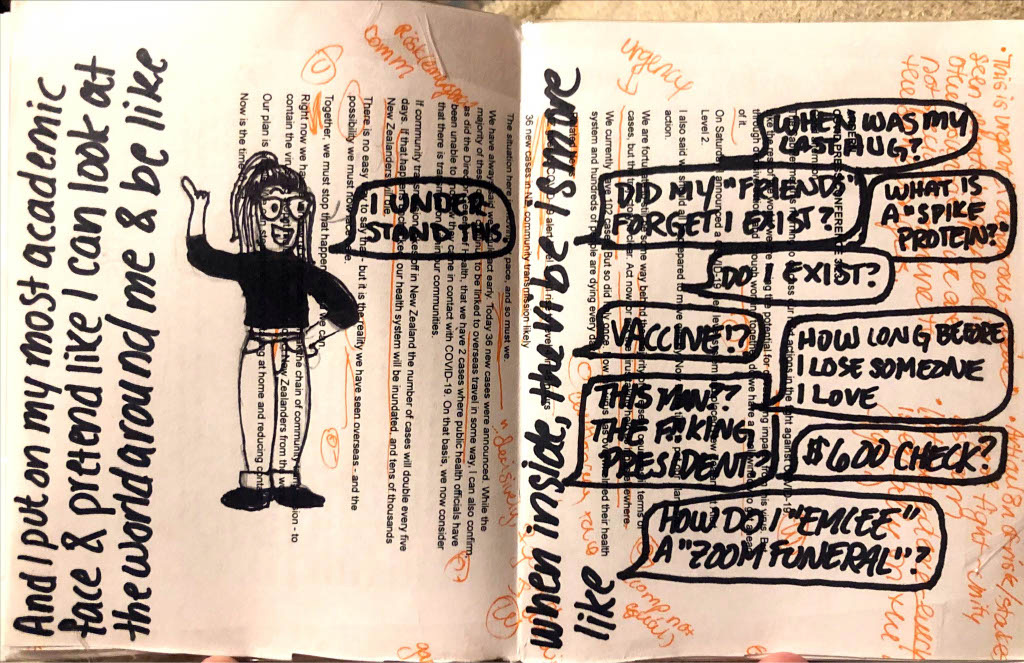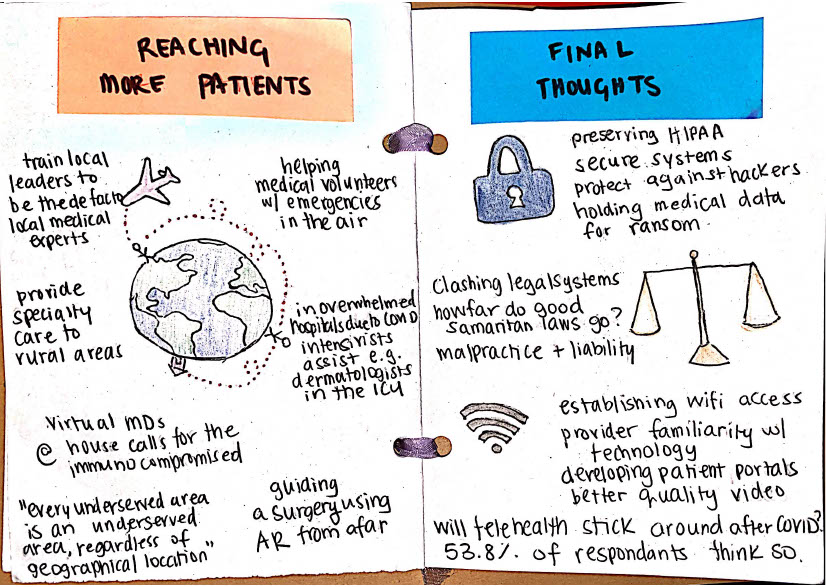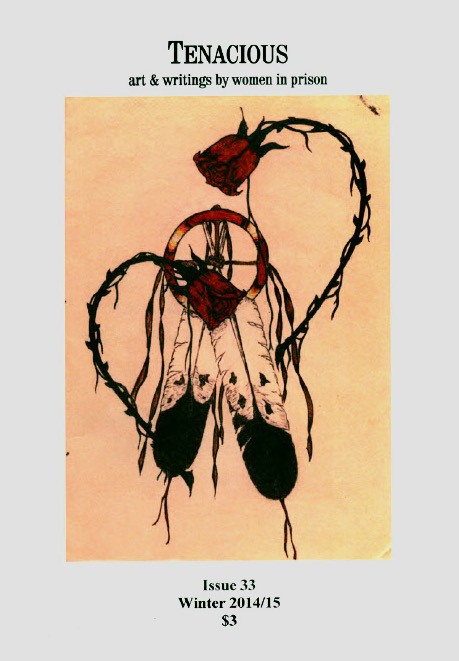Zines as expressive writing
In spring 2020, I was teaching a seminar on Global Health, Politics and Society. Students are expected to do their own original research, to gather their own data, and to write a fairly long research paper as part of it. This academic year, I added an option: in addition to the research papers, students could also submit, if they wanted to, a zine. Thinking in light of COVID, the idea there was to find some new way to think about academic work, something that might be a little bit different, and outside of the boundaries of normal academic writing, which I thought might make sense given just the strange semester that we're having. The idea came from one of the CEP workshops, when Jenna Freedman was talking to faculty about what zines are. I talked to Jenna and we thought it might be a good idea to have just a short zine submission that was optional, with a really open ended prompt. Students could be writing about something related to the course, or doing a zine on COVID-19 or presenting their own research findings or just about how they're feeling.
I was quite pleasantly surprised by the students’ work. I was a little bit nervous because I haven't done anything like this in class before and I had no idea how students would respond to learning about zines and creating their own. But we went around the room and shared the zines they had created and thought it was really nice. Several students mentioned that it felt therapeutic. We saw some zines that had to do with just what they were feeling during COVID, things that just expressed their emotions, whether through freeform writing, or through different kinds of art that they were drawing. Students also mentioned that zines were a nice way to think about the research that they were doing. So for instance, a couple of my students were doing research on telehealth. One student mentioned as she was showing us her drawing that she felt that trying to visualize her findings and to draw out what she was researching - ideas like remote intimacy that was being developed [in telehealth] - she found it a helpful way to think about her own argument, that there was something about trying to draw it out in a zine format that changed the way that she felt about it.
We saw the completed ones on the last day of class when students were just sharing something that they were working on. Some students decided to do a zine version of their research, something that could be read for a more public audience.
I was really happy to hear that one of my students did a zine on representations of the Philippines in a very critical way and she took a big step. She told me, “I took that initiative, and I decided to publish my zine.” That was really nice to hear.
I feel like the zines have been helpful also for my students during research, both in the seminar that I mentioned, but also for my thesis students. So I think one of the challenges that a lot of students and I think also faculty have been feeling is how to do social science research that often involves interacting with people during a pandemic. I felt like a lot of students mentioned that something they were proud of was that they were getting creative and finding ways to do research during the pandemic. And the same with my thesis students. It’s just harder to collect data in ways that you may have previously anticipated.
One of my thesis students who's interested in the medical experiences of incarcerated women started using zines as one way to understand those experiences. I think she's also interviewing formerly incarcerated women, but also going to the zine library and I think just checking out a very large collection of zines that were written by formerly incarcerated women and having that be a rich data source for her to understand those experiences. I think previously when we think about sociological methods that we would use for student projects, and also just for our projects in general, we think of things like ethnography, interviewing, doing a survey or an experiment. And so not to say that they don't draw on textual analysis, but I think zines may not have been something that we would have previously thought of as a key data source But I think in light of the constraints that we’re feeling with COVID and the kinds of research that we're able to do, I think that also pushed everyone to try to get more creative in finding what are other ways that I can understand people's experiences. And I think zines, at least for her, became an important part of getting at those experiences, because they were written by women, and they have the emotion and feelings expressed through those zines.
Definitely using zines in class has been helpful research-wise. But I think about how my students mentioned that this also felt therapeutic to them during this time. Teaching and learning during a pandemic, doing everything virtual - it's a difficult and very new experience. And I think we’re trying to push forward and act as if we’re doing our normal work. But really - it does not feel normal.
So I think having even just a little bit of time in class to do the zines was a nice moment to just really just openly acknowledge that this is a strange time. And many students just took the prompt of “How am I doing right now?” as the focus of their zines. Finding different ways to express how they're feeling and also visualizing how at times they can feel really connected with other people and other times they feel kind of alone was important. So I think it was a helpful way just to talk openly and to express how you're feeling in this strange time and a good way of just acknowledging the moment that we’re in. And it was also a nice change of pace with all the online teaching and learning that we're doing even just to spend, you know, 20 minutes in our class to get your pen and paper and to do something in that kind of way. I think there was also a positive feeling from that.
Online learning
I know that a lot of students are sharing space, either with other students or their families. And so there's definitely the real question of everyone trying to share the bandwidth and it can be challenging sometimes to connect when everyone in a particular household is also trying to connect at the same time. So I think there's challenges there and a lot of issues with potential inequality: which students have access to the online format? And also, especially with everyone in different places, students are also working from a variety of different contexts. I have students connecting from Asia and in completely different time zones with different kinds of infrastructure that might be available for the internet. I feel like there's an assumption that everyone has access and is able to join in the same way, when really, there might be a lot of other challenges that don't get discussed until something goes wrong.
I am trying to think of ways where students can communicate more or get to know each other more in a virtual setting. I also teach a class in Methods and we usually offer the third research assignment to be a partner assignment. And this semester, there were surprisingly few students who partnered up. And I think that's perhaps in part because even though they are in discussion sections, they may not make friends and get to know each other in the same way as they normally would. I’m hearing the advice of other colleagues about how to use things like Padlet to try to foster a discussion community so that people can connect concepts and talk with each other in a particular group. I've also sometimes found that even in verbal discussions in class, sometimes it can be helpful just to take a moment where people write out their thoughts. Something I tried to do in my larger Methods class is to have punctuated moments where it's like, “Okay, if you have a pen and paper or if you want to do it on the computer, you can do it on a computer, but just do a one minute free write about a research idea you're interested in.”
New approaches to research during the pandemic
Seeing all my students turn to things like zines, and being really creative with how they're finding their data, it also makes me think - especially as a qualitative researcher, where a lot of my research is based on fieldwork, or based on interviews with people - how can I also be a little bit more creative in this extended period of time, so that I can also understand some of the experiences that people are going through? I used to do research in Malawi, on the HIV epidemic. So something I've been thinking about is how these prior global health initiatives around HIV, prepare or don't prepare countries like Malawi for a new pandemic threat. So I've been drawing on this collection called the Malawi Journals Project. It’s a collection of journals or diaries, written by people in Malawi. And for a long time, it was about their lives during the HIV epidemic, and they would write them and they're commissioned by researchers, and seen as literary texts that anonymous authors in Malawi produce (or not anonymous, if they prefer to be named), that researchers could use to do textual analysis of. So for a long time, it was collected on the HIV epidemic. And more recently, in light of COVID, researchers have also been commissioning journals where people write about just their life experiences during the COVID pandemic. So they are writing about conversations they've had, or things that they've overheard, and just kind of their life right now. That's been something that I've been using more of, especially since going and traveling and doing research is not possible. And I feel like it’s such a rich data source that I feel like I'm starting to engage with now and realizing that there's just such amazing years’ worth of just amazing journals to dive into. So I think both for my students and also for me, this period has meant taking the constraints of the pandemic and turning towards these new data sources that I'm coming to learn are just so incredibly rich and interesting and can tell us a lot about people's experiences.


